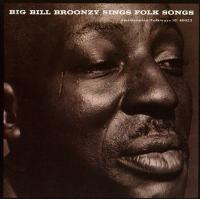Big Bill Broonzy Sings Folk Songs From Vinyl Me, Please
The company began shipping its reissues back in 2013 and has so far attracted around 15,000 subscribers, who for an annual fee of $284 receive by a record a month. That works out to a little under $24 a record. A quarterly $75 subscription is also an option as is, for the super cautious, a month to month $27 trial subscription.
They press on 150 gram and up vinyl from various pressing plants depending upon the release, each of which includes a wraparound folder in which is a commissioned piece of art on heavy stock.
The wraparound includes a poem of sorts, notes on the fold over plus a mixed drink recipe—I’m not kidding.
When the company offered to send me their reissue of Big Bill Broonzy Sings Folk Songs (Folkways Records FA 2328) I took them up on the offer. The Smithsonian owns the Folkways catalog and recently expressed an interest in vinyl reissues so Vinyl Me, Please perused the catalog and chose well.
Broonzy (real name Lee Conley Bradley) passed away in 1958 at age 65. This record, released in 1962 consists of unreleased studio recordings for Moses Asch’s Folkway Records and some songs recorded during a 1956 concert at Northwestern University’s Chan Auditorium with Peter Seeger, first broadcast on Chicago’s WFMT. By that time he’d been performing for almost forty years.
Broonzy was born in rural Arkansas in 1893 and began his musical career as a fiddler in a black string band. When he moved to Chicago in the 1920’s he saw that single artists accompanying themselves on guitar were popular so picked up a guitar and learned to play it. He was sufficiently successful at it to record for Paramount Records, which was the premier blues label of that era.
He was a very popular blues and folk artist in the ‘30’s and ‘40s, even playing Carnegie Hall in 1938, where he debuted a new song called “Just A Dream” in which he imagined a black getting a warm White House welcome in the Oval Office by the President. In the song he wakes up, realizing it was “just a dream”. Times have changed far beyond his wildest dream!
After WWII Broonzy toured Europe to appreciative audiences, changing his music to appeal to white politically active audiences Vinyl Me, Please has done an excellent job with the physical package. Anyone owning original Folkways records will find the cover art and packaging authentic down to the matte sepia cover, pebbled black jacket back and black inner sleeve, here plastic lined. Inside is a folded and stapled booklet containing the original notes as well as new ones by Broonzy biographer Bob Riesman in which he describes Broonzy’s early ‘60s English television appearances, said to have influenced Pete Townshend, Keith Richards, Ray Davies and Eric Clapton who said watching Bill perform felt “…like I was looking into heaven.”
The songs here include familiar ones like “This Train”, “Bill Bailey”, “John Henry” and “Glory of Love” as well as some that are less well known. These are country blues, beginning with “Backwater Blues”. You can almost hear the crickets chirping.
Maybe you’ll hear how Broonzy may have influenced Muddy Waters, who was a fan. In fact, in 1960 Waters recorded for Chess an album called Muddy Waters Sings “Big Bill” (Chess LPS 1444). In 2003 Speakers Corner produced a nicely done reissue mastered by Willem Makkee that’s still in print.
This reissue came packaged in a foldover containing a piece of original color artwork by McKenzie Nelson of an abstract “hair” train topped by an old Shure microphone riding on “hair” tracks. The mixed drink is a sidecar: Cointreau, lemon juice and cognac.
The value added by these extras is something you’ll have to judge for yourself if you pick this title up or try a trial subscription.
The master tape resided at The Smithsonian and could have been used to cut lacquers, but instead the decision was made to first digitize it. Ridiculous in my opinion, but as you’ll see and hear, the mastering engineer did a meticulous job using gear you’ll like.
The recorded mono sound quality is pretty good to begin with—especially the studio recordings, which are remarkably transparent— and whatever the digits added or took away doesn’t do anything objectionable. However, this one is not about sonic spectacular-ness.
Vinyl Me, Please has done an excellent job with this reissue and when I imagine young subscribers receiving and playing this record, which they otherwise probably would never have heard, it makes me think that Vinyl Me, Please is doing a great thing, surpassed only by the vinyl resurgence itself.
The first YouTube video shows the tape being mastered to digital by Pete Reiniger
The second shows Pete Reiniger approving the test pressing. Dig the playback system your tax dollars have bought. I approve of the spending!
This YouTube is of Studs Turkel interviewing Broonzy in 1953 on WFMT.


